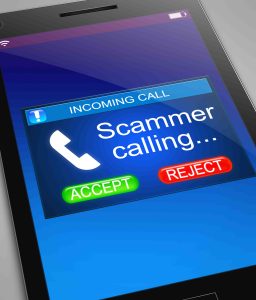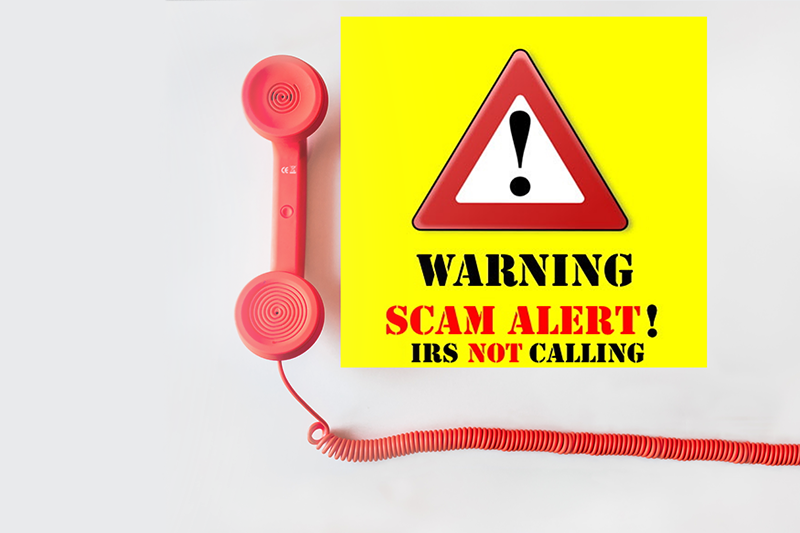By J.A. Jones, Staff Writer
The Internal Revenue Service has issued a warning about Coronavirus-related scams. While it’s sad to discover there are people out there trying to scheme the hard-pressed out of some relief during this time, as the saying goes, “Cash rules everything around me,” and there’s never a wrong time for con artists to do their conning.
The IRS’ Criminal Investigation Division has seen an uptick of new and evolving phishing schemes. On their website, the Internal Revenue Service shares information for taxpayers to be on the lookout for. Scam calls and email phishing attempts about the Coronavirus, or COVID-19 are on the rise and can lead to tax-related fraud and identity theft.
 IRS Commissioner Chuck Rettig is quoted, “We urge people to take extra care during this period. The IRS isn’t going to call you asking to verify or provide your financial information so you can get an economic impact payment or your refund faster. That also applies to surprise emails that appear to be coming from the IRS. Remember, don’t open them or click on attachments or links. Go to IRS.gov for the most up-to-date information.”
IRS Commissioner Chuck Rettig is quoted, “We urge people to take extra care during this period. The IRS isn’t going to call you asking to verify or provide your financial information so you can get an economic impact payment or your refund faster. That also applies to surprise emails that appear to be coming from the IRS. Remember, don’t open them or click on attachments or links. Go to IRS.gov for the most up-to-date information.”
The IRS warned that people should also be on the lookout for text messages, websites, and social media attempts claiming to need personal information — and of course, anything that requests money can be fraudulent.
IRS Criminal Investigation Chief Don Fort also chimed in regarding the need for cautious awareness at this time.
“History has shown that criminals take every opportunity to perpetrate a fraud on unsuspecting victims, especially when a group of people is vulnerable or in a state of need. While you are waiting to hear about your economic impact payment, criminals are working hard to trick you into getting their hands on it. The IRS Criminal Investigation Division is working hard to find these scammers and shut them down, but in the meantime, we ask people to remain vigilant.”
It’s a good time to check in with the seniors and retirees in your life as well – and make sure they’re not acting on any calls, texts, or emails requesting financial information. The IRS has stated that seniors/retirees who don’t have to file a tax return don’t need to do anything to receive their $1,200 economic impact payment.
Retirees – including recipients of Forms SSA-1099 and RRB-1099 – should be advised that no one from the IRS or any other agency will be reaching out to them by phone, email, mail or in person to ask for information related to their economic impact payment (or, rebates or stimulus payments, as they’re sometimes called).
Retirees will automatically receive their payment from the IRS.
Make sure your senior retirees know this – and check in with them now to give them a heads up on the rising instances of scammeration going on.
One recent scheme shared on social media outlined how a senior received a phone call from a family member who was suddenly “in jail.”
“My mom answered an incoming call. She said the person on the line sounded upset and said, ‘Hi mom, sorry I sound so bad, I have a really bad cold.’ It was not my brother but sounded enough like him—with a bad cold—to have her believe him. He told her that he was in an accident, was in jail, and he wanted her to talk with his attorney friend.
“Then another guy got on the line and explained that my (not) brother had been on his way to CVS to get meds for his cold, was distracted by his phone while driving and hit someone. He said he was in jail on reckless endangerment charges, and the judge set bail at $120,000, so to get out he would need $12K ASAP. He asked her for her current address.”
Needless to say, this was a scam — no one related to the senior had been in an accident, but if a wary family member hadn’t jumped on the phone quickly, an amount that could bankrupt any U.S. citizen in today’s economy would have been stolen. Others have reported seniors being scammed out of amounts such as $10,000, or $7,000, depending on the crooked caller.
Most of the time, economic impact payments will be transferred by the taxpayer’s direct deposit information. If you or a family member paid taxes, don’t provide your direct deposit or other banking information to anyone besides a trusted financial advisor if you don’t plan to do it yourself.
Any of these are indications something very unofficial – in other words, scammy — is going on:
- Scammers may emphasize the words “Stimulus Check” or “Stimulus Payment.” The official term is economic impact payment.
- The caller asks the taxpayer to sign over their economic impact payment check to them.
- Someone contacts you by phone, email, text, or social media asking for verification of personal and/or banking information — saying that the information is needed to receive or speed up your economic impact payment.
- Someone contacts you or a relative stating that they can help you get a tax refund or economic impact payment faster. This scam can be conducted by social media, email, phone call — or even in person.
- Someone sends you or a family member a fake check, maybe of an odd amount, and tells you to call a number or verify information online in order to cash it.
Report Coronavirus-related or other phishing attempts to the IRS
If you or a loved one are getting these kinds of fraudulent calls, emails, text messages or social media requests for information that seem to be from the IRS or an organization linked to the IRS – such as Electronic Federal Tax Payment System (EFTPS) – you should forward it to phishing@irs.gov.
Learn more about reporting suspected scams by going to the Report Phishing and Online Scams page on IRS.gov.








